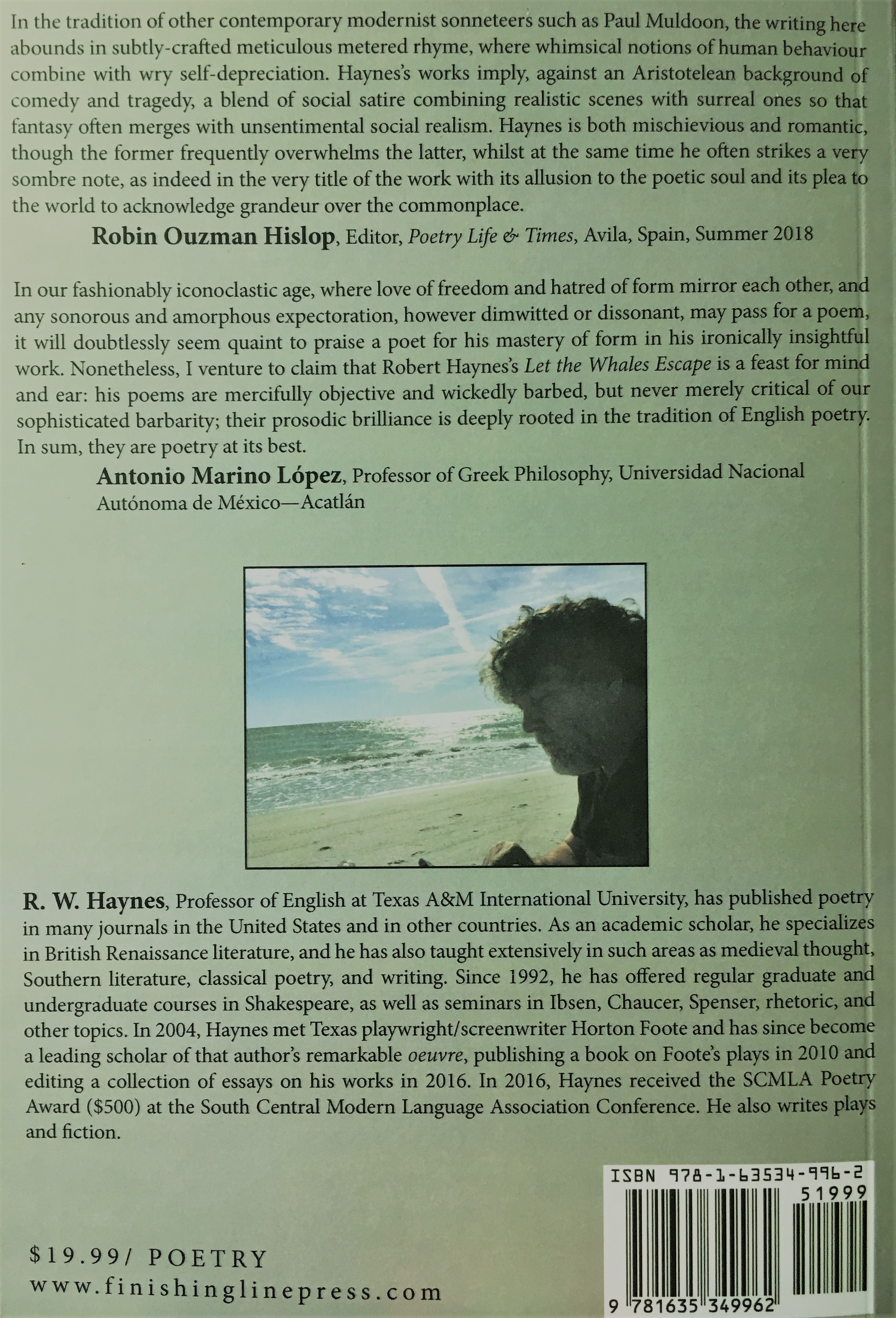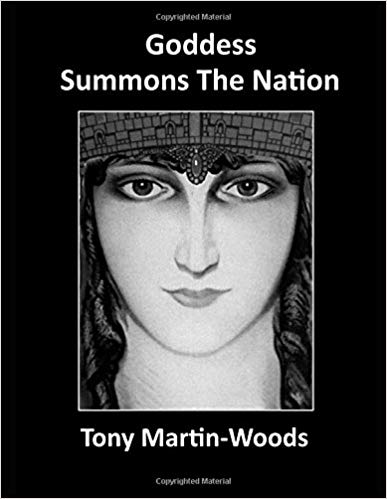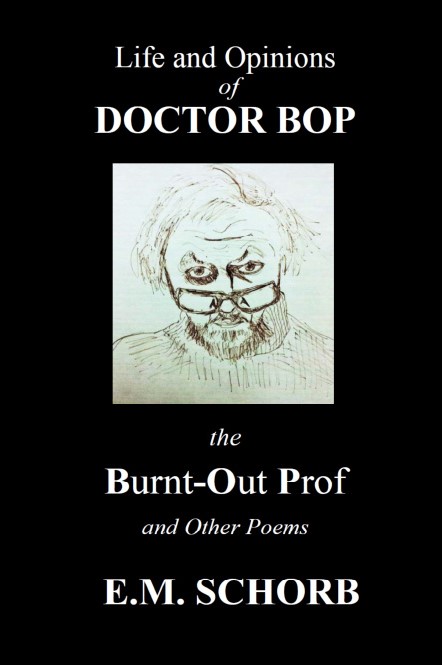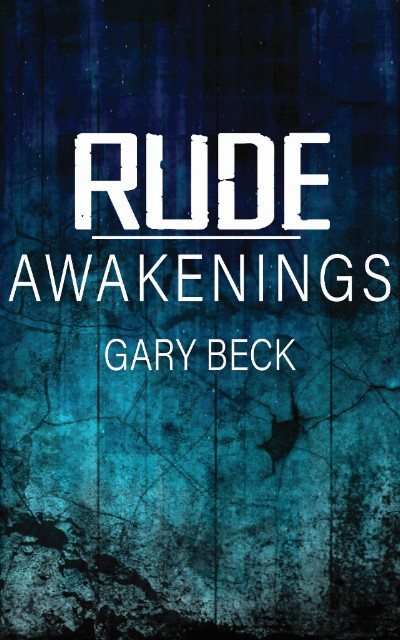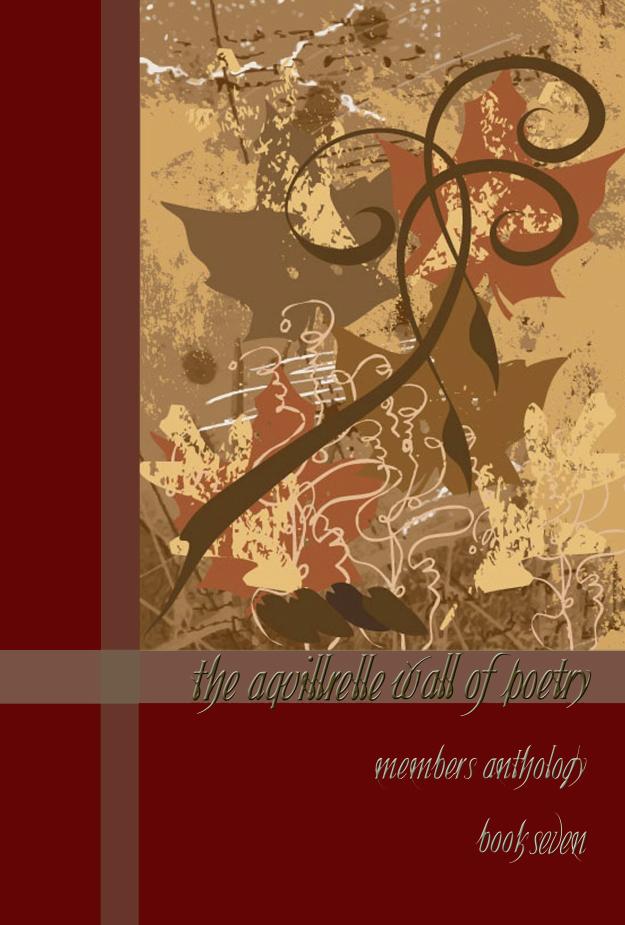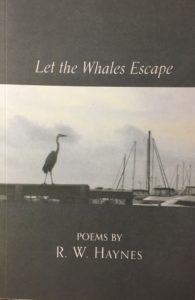


Let the Whales Escape R.W.Haynes
Mona Lisa and the Marlboro Man
Not knowing if wisdom would impulsively fly
Or if it dragged its feet when impulse flared,
She had to make the call and suddenly try
To do what an immortal would have dared,
An Aphrodite, ascending in a flying cart
Drawn by fifty gurgling pigeons at a speed
Which matched the speed of her own matchless heart
And the heartbreaking glory of her need.
Later, back in Laredo, she would say
She didn’t know why she’d taken off that way,
Smiling with satisfaction, recalling when
Her best moments flew by delightfully then.
He didn’t want anyone saying, “Oh.
This is how I feel,” but people do
Say that, and he said it, sometimes, too,
In unguarded moments, and he would show
How he felt, displaying great disdain
As he lit his pipe, blew blue smoke forth
Delivering himself from aesthetic pain
Incurred by foolish ideas from the North,
And, nodding slightly to appreciate
A tolerable turn of phrase which he
Thought suggested some brain activity,
He let his tobacco counter-obfuscate
Suspicious overflows of raw emotion
Which threatened to undermine devotion.
On the Balcony of the Palacio de Cortés
Madness stands at one elbow. At the other
Various figures in masks take their turns,
And all whisper steadily, one after another,
Syllables whose content one never learns.
The maniac is familiar; one keeps a careful eye
On him night and day, and day and night,
But who are the others who are standing by,
And what are these advisements they recite?
I dream the lonely ghost of love is one
Whose only consolation is to speak of sin,
And when that sad companion is done,
I hear Complacency, Madness’s mad twin.
I listen in patience, fighting back the fear
I’ll never hear the voice I hope to hear.
Ibsen on the Nile
Those monuments are monuments merely
Of themselves; this river of nutrition
And death, inundating Egypt, is clearly
A muddy embodiment of time’s volition.
I saw the Sphinx off in the distance. Today
I purchased an ancient mummified hand
To give to my wife, safely far away,
And I suspect that she will understand.
I met DeLesseps recently. He and I
Have much in common, more than he knows;
My work is lonelier, but there exists a tie
Between what we do as humankind grows.
These monuments record the vanity of ages;
Mine put the outraged human soul on stages.
Robin Ouzman Hislop is Editor of Poetry Life and Times ; his publications include
All the Babble of the Souk , Cartoon Molecules and Next Arrivals, collected poems, as well as translation of Guadalupe Grande´s La llave de niebla, as Key of Mist and the recently published Tesserae , a translation of Carmen Crespo´s Teselas.
You may visit Aquillrelle.com/Author Robin Ouzman Hislop about author. See Robin performing his work Performance (University of Leeds)
Press Release
Amparo Arróspide Reviews Goddess Summons the Nation Collected Poems by Tony Martin Woods
Goddess Summons the Nation Paperback
Goddess Summons the Nation Kindle Edition

Goddess summons the Nation
a book of poems written with the vocation of songs and minstrelsy, articulated in four chapters with revealing titles, Substructure, Superstructure, Demolition and Flowers. Full of irony, the poetic voice, which is an ethical, indignant voice, wants the written script to transcend in spoken writing (The grapes / don’t die / in the vineyard / with the harvest / in the summer. // They transcend / and translive / victorious / in the wine, // like the poem in the song … ). This book talks to the reader in short, concise verses, with lexicon of the perspective of one who stands on the brink of historical abyss (The West bleeds to death /…). To paraphrase Ezra Pound, this book has style, that is to say, limpidity, as opposed to rethoric; where the poet in dealing with his own time, sees that language does not petrify in his hands; he has prepared for new advances along the lines of true metaphor, that is interpretative metaphor, or image, as diametrically opposed to untrue or ornamental metaphor. These poems daringly address Brexit and Trump, the policy of closing borders and xenophobia, and a nation that appears personified in female allegories – I am the matriot / the highest patriot / I serve my shares / I sooth my country /…, and cyborgs who leave a planet in ruins ( his brain compressed in a zip folder / stored in a private cloud // No memories / just data / …), our own planet from which figs also flee (with millions of figs like me, like you / away from a supernova / of stupid national greed / … ). In one poem, Time to leave Brexit, we can also read the condensed intention of the book: I’ve never been an island, / Nor a chunk of it. / I could never be one / Cause I’m a social being / made of flesh / And emotions. Images of flesh and bone, and emotions that readers will share.
Editor’s Note: see also Artvilla.com Goddess Summons the Nation. By Tony Martin Woods.
Goddess summons the Nation
un poemario escrito con vocación de cancionero y de mester de juglaría, articulado en cuatro capítulos con títulos reveladores, Substructure, Superstructure, Demolition y Flowers. Pleno de ironía, la voz poética, que es una voz ética, indignada, y que pretende que la escritura escrita trascienda en la escritura hablada (The grapes/don´t die/in the vineyard/with the harvest/in the summer.// They transcend/and translive/victorious/in the wine,// like the poem in the song/…). Se interpela al lector en versos breves, concisos, con léxico de nuestro tiempo y una temática actual de quien se sitúa al borde del abismo histórico (The West bleeds to death/…). Parafraseando a Ezra Pound, este es un libro con “style, that is to say, limpidity, as opposed to rethoric”, donde el poeta “in dealing with his own time, sees to it that language does not petrify in his hands; he has prepared for new advances along the lines of true metaphor that is interpretative metaphor, or image, as diametrically opposed to untrue or ornamental metaphor”. Los poemas se atreven con el Brexit, con Trump, con la política de cierre de fronteras y xenofobia, con una nación que aparece personificada en alegorías femeninas – I am the matriot/ the highest patriot/ I serve my shares/ I sooth my country/, y con cíborgs que abandonan un planeta en ruinas (his brain compressed in a zip folder/stored in a private cloud// No memories/just data/…), planeta del que también huyen los higos ( with millions of figs like me, like you/ away from a supernova/of stupid national greed/…). En uno de sus poemas, Time to leave Brexit, también podemos leer la intención condensada del libro: I´ve never been an island,/Nor a chunk of it./ I could never be one/Cause I´m a social being/made of flesh/And emotions… Imágenes de carne y hueso, y emociones que compartirán lectores y lectoras.

Antonio Martínez Arboleda:
Antonio (Tony Martin-Woods) started to write poetry for the public in 2012, at the age of 43, driven by his political indignation. That same year he also set in motion Poesía Indignada, an online publication of political poetry. He runs the poetry evening Transforming with Poetry at Inkwell, in Leeds, and collaborates with 100 Thousands Poets for Change100tpc.org/. Tony is also known in the UK for his work as an academic and educator under his real-life name, Antonio Martínez Arboleda at the University of Leeds. His project of digitisation of poetry, Ártemis, compiles more than 100 high quality videos of Spanish poets and other Open Educational Resources. http://www.artemispoesia.com/ . He is the delegate in the UK of Crátera Revista de Crítica y Poesía Contemporánea , where he also publishes his work as translator from English into Spanish. He published his first volume of poetry in Spanish, Los viajes de Diosa (The Travels of Goddess), in 2015, as a response to the Great Recession, particularly in Spain. His second book, Goddess Summons The Nation, is a critique of the ideas of nation and capitalism, mainly in the British Brexit context. It incorporates voices of culprits, victims and heroes with mordacity and rhythm. It consists of 21 poems, 18 of which are originally written in English. It is available in print and kindle in Amazon and other platforms. Editor’s note: further information bio & academic activities can be found at this link: https://ahc.leeds.ac.uk/languages/staff/91/antonio-martinez-arboleda

Amparo Arrospide (Argentina) is a Spanish poet and translator. She has published seven poetry collections, Mosaicos bajo la hiedra, Alucinación en dos actos algunos poemas, Pañuelos de usar y tirar, Presencia en el Misterio, En el Oido del Viento, Hormigas en Diáspora and Jaccuzzi, as well as poems, short stories and articles on literary and film criticism in anthologies and in both national and foreign magazines. She has received numerous awards. Editor’s Note: see also Poetry, National Literature Prize 2018, Francisca Aguirre, Translated from Spanish by Amparo Arróspide & Robin Ouzman Hislop
100 Thousand Poets for Change Leeds 2017 Free On Line Anthology
100 Thousand Poets for Change (100TPC) is a worldwide artistic movement whose aim is to raise awareness about our man-made social, political, environmental, moral and economic crises.
Artists have an especial sensitivity and language, as well as a commitment to beauty, spirituality and truth and that is why Artists can and should make a difference in bringing people together and reinforcing their solidarity, with a view on transforming society.
This book was incepted as a digital initiative supporting the 2017 100TPC events across the World that took place on 30 September 2017 concertedly with Thousands of other Artists on the whole planet, including our own reading in Leeds, held in The Chemic Tavern in Woodhouse under the auspices of Word Club.
We have included poems by generous West Yorkshire artists who wanted to contribute to our cause by responding to our invitation with poems on: Revolution, War, Streets, Business, Nations, Equality, Politicians, Conquest, Racism, Love, Europe, Nature, Death, Life, The World, The Good, the Great, the Evil. The Human and beyond.
This is the second of a series of 100TPC published by Transforming with Poetry, this time in conjunction with Word Club.

Co Editors of 100 Thousand Poets for Change (100TPC) Leeds 2017. UK
Mark Connors:
Mark Connors is a poet and novelist from Horsforth, Leeds. His debut poetry pamphlet Life is a Long is a Long Song was published by OWF Press in 2015. His first full length poetry collection, Nothing is meant to be Broken was published by Stairwell Books in 2017. Mark won the Ilkley Literature Festival Open Mic competition in both 2014 and 2015 and has received a number of prizes and commendations for his short fiction. His debut novel Stickleback was published by Armley Press in 2016 and was longlisted for The Guardian’s ‘Not the Booker Prize.’ His second novel, Tom Tit and the Maniacs was published in 2018 by Armley Press. He runs spoken word nights for WORD CLUB in Leeds and comperes and performs regularly at Literature Festivals. He is a managing editor of the new independent publishing company, Yaffle Press, For more info visit www.markconnors.co.uk

Antonio Martínez Arboleda:
Antonio (Tony Martin-Woods) started to write poetry for the public in 2012, at the age of 43, driven by his political indignation. That same year he also set in motion Poesía Indignada, an online publication of political poetry. He runs the poetry evening Transforming with Poetry at Inkwell, in Leeds, and collaborates with 100 Thousands Poets for Change. Tony is also known in the UK for his work as an academic and educator under his real-life name, Antonio Martínez Arboleda. His project of digitisation of poetry, Ártemis, compiles more than 100 high quality videos of Spanish poets and other Open Educational Resources. http://www.artemispoesia.com/ . He is the delegate in the UK of Crátera Revista de Crítica y Poesía Contemporánea , where he also publishes his work as translator from English into Spanish. He published his first volume of poetry in Spanish, Los viajes de Diosa (The Travels of Goddess), in 2015, as a response to the Great Recession, particularly in Spain. His second book, Goddess Summons The Nation, is a critique of the ideas of nation and capitalism, mainly in the British Brexit context. It incorporates voices of culprits, victims and heroes with mordacity and rhythm. It consists of 21 poems, 18 of which are originally written in English. It is available in print and kindle in Amazon and other platforms.
Robin Ouzman Hislop is Editor of Poetry Life and Times his publications include All the Babble of the Souk and Cartoon Molecules collected poems and Key of Mist the recently published Tesserae translations from Spanish poets Guadalupe Grande and Carmen Crespo visit Aquillrelle.com/Author Robin Ouzman Hislop about author. See Robin performing his work Performance (University of Leeds) and his latest Collected Poems Volume at Next-Arrivals
Life and Opinions of Doctor BOP the Burnt-Out-Prof. Collected Poems by EM Schorb. Reviewed by Robin Ouzman Hislop
Excerpt from
Life and Opinions of Doctor BOP
A poem is a posit, an assertion, an act,
and in action we forget fear: respite
in creation, the maker takes a stand, in making,
but is it a stand no better than gimmick-makers make?
Well, poetry possesses the virtue of being a record,
at least, and you can date a poem, if you wish,
thus giving it the merit of a worldly fact
contained in a system of time, which, admittedly,
is a system which is perhaps pseudo-fact itself,
or will become so as matter completes its withdrawal
upon itself to revisit its beginnings in a black hole in space;
and yet, until then, something like a fact,
a fact in the sense that Sherlock Holmes is almost real
and lives in Baker Street in a fictional series
in a real world that may exist only in a dream
that is being dreamed elsewhere, perhaps—dare I say—
by Yahweh; and so poetry becomes an actual little stab
and, poets hope, rip in the black sheet
that covers the deserted, haunted mansion.
Reviewed at:
Amazon.co.uk Life and Opinions of Doctor BOP the Burnt-Out-Prof and Other Poems . See also: Amazon.com
Amazon.co.uk Emanations from the Penumbra Poems EM Schorb See also: Amazon.com
Review of
Life and Opinions of Doctor BOP
by
Robin Ouzman Hislop (Editor of PLT)
Many poets often turn to playwrites, more so than the other way about, and undoubtedly, imo, EM Schorb’s early background in theater has led to his latest theme in poetics “Life and Opinions of Doctor BOP ( the Burnt – Out – Prof and other Poems)”. In fact, it seems to me, the entire text hovers between sketches, vignettes, and biographic autobiographical narration in the first person. As a European, but one who has followed, as well, with keen interest North Amercan academia in poetics. As much as philosophy, related to cosomology and evolutionary concerns in the new sciences. It comes as an edifying experience to be introduced to the home grown frantics of North American Campus life, or insomuch, the affect it has had on our character in question, Doctor BOP. Actually, in the reading of the first part of this three part volume, a practically epic poem consisting of some seventeen pages, I was strangely reminded of the later short story writings of JD Salinger’s depiction of University life as an undergraduate English lecturer. He was in fact, as he describes himself, a rather reclusive English lecturer. And one of his passages springs vividly to mind, as he mentions in a more or less autobiographical narration, how as a now muchly graying and aging professor, he hastily makes himself scarce, the moment a group or anything like of under 40’s looms on his horizon, (on the Campus). A far cry from the days of Catcher in the Rye, perhaps we might encounter our Doctor BOP, as Schorb portrays him, as having travelled a somewhat similar way, perhaps a universal way of all burnt-out-profs. At least for the birth of our Doctor BOP, as he emerges from the Yiddish community, where due to a series of social phenomena peculiar to North American modern history, he finds himself born into the world of academia at midriff with his family’s origin, social background and status. Here Schorb brings his own background knowledge of Yiddish custom and vocabulary into full play in all its richness, in the first part of the central theme to the work. It is but one of the literary treats he devises. The whole text is replete with a classical apotheosis, religious epitomes, literary analogues and philosophical allusions, all of which abound in the head of Doctor BOP, as he makes his final but defiant bow before the world. The poems obviously are tragico/comico, there is satire, irony, bitterness, humour and kindness blended together with eruditeness. The text is littered with phrases in Latin, Greek, Yiddish, Spanish, we even have augenblick (in the blink of an eye, or in the moment) for Hamlet in German, and of course, Orator fit, poeta nascitur, poeta nascitur, non fit. (A speaker is made, a poet is born, not made). According to Doctor BOP, who quotes extensively from bibliographies of writers past and present and salutes us in the final part of the first part with vaya con Dios, my Darlings. Doctor BOP makes a delightful read, which the two latter parts of this small volume only serve to embed, and is well worth the buy, if only to raise the dust from our minds to reminisce over our studious years and the host of miscellenious trivia that is the heritage of our race in all its travail – a poor player who struts and frets his hour upon the stage and then is heard no more – to coin yet another allusion.
Biography

E. M. Schorb attended New York University, where he fell in with a group of actors and became a professional actor. During this time, he attended several top-ranking drama schools, which led to industrial films and eventually into sales and business. He has remained in business on and off ever since, but started writing poetry when he was a teenager and has never stopped. His collection, Time and Fevers, was a 2007 recipient of an Eric Hoffer Award for Excellence in Independent Publishing and also won the “Writer’s Digest” Award for Self-Published Books in Poetry. An earlier collection, Murderer’s Day, was awarded the Verna Emery Poetry Prize and published by Purdue University Press. Other collections include Reflections in a Doubtful I, The Ideologues, The Journey, Manhattan Spleen: Prose Poems, 50 Poems, and The Poor Boy and Other Poems.
Schorb’s work has appeared widely in such journals as The Yale Review, The Southern Review, The Virginia Quarterly Review, The Chicago Review, The Sewanee Review, The American Scholar, and The Hudson Review.
At the Frankfurt Book Fair in 2000, his novel, Paradise Square, was the winner of the Grand Prize for fiction from the International eBook Award Foundation, and later, A Portable Chaos won the Eric Hoffer Award for Fiction in 2004.
Schorb has received fellowships from the Provincetown Fine Arts Work Center and the North Carolina Arts Council; grants from the Ludwig Vogelstein Foundation, the Carnegie Fund, Robert Rauschenberg & Change, Inc. (for drawings), and The Dramatists Guild, among others. He is a member of the Academy of American Poets, and the Poetry Society of America.
PRIZE-WINNING BOOKS
BY E.M. SCHORB
Books available at Amazon.com
_______________________________________
Dates and Dreams, Writer’s Digest International Self-
Published Book Award for Poetry, First Prize
Paradise Square, International eBook Award
Foundation, Grand Prize, Fiction, Frankfurt Book Fair
A Portable Chaos, The Eric Hoffer Award for Fiction,
First Prize
Murderer’s Day, Verna Emery Poetry Prize, Purdue
University Press
Time and Fevers, The Eric Hoffer Award for Poetry
and Writer’s Digest International Self-Published Book
Award for Poetry, each First Prize
Robin Ouzman Hislop is Editor of Poetry Life and Times his publications include All the Babble of the Souk and Cartoon Molecules collected poems and Key of Mist the recently published Tesserae translations from Spanish poets Guadalupe Grande and Carmen Crespo visit Aquillrelle.com/Author Robin Ouzman Hislop about author. See Robin performing his work Performance (University of Leeds) and his latest Collected Poems Volume at Next-Arrivals
Aquillrelle’s Best. Anthology of Poetry. Press Release
Aquillrelle’s Best Anthology of Poetry
How do you pack 61 poets in between 2 covers and keep the result mesmerizingly interesting? Simple. You just pack 61 poets in between 2 covers. Oh, yes, you also make sure their styles are as unexpected and as incoherent as an orchestra tuning its musical instruments. Oh, yes, you also make sure their art’s beauty is as unexpected and as coherent as a flock of starlings dancing in the sky. Oh, yes, sure, you also make sure the mix of the proposition is as unexpected and as varied as the space between the 2 covers allows regarding gender, nationality, sexual orientation, origins, language (translated of course), religion, age, profession, experience… and so on and on and on. Oh. Yes. You also do not forget the voice of those who lost their voice forever and ensure it lives on. Forever.
The paper nugget you are holding in your hands is worth its number of pages in ounces of gold. Probably more. Numerous poets included in it have been nominated-for/shortlisted-in/finalists-at/recognized-by and, of course, won a large number of high-profile high-quality writing prizes, titles, honorable mentions and awards on national and international schemes. A far from exhaustive list of which includes: National Women Hall of Fame membership, Zoetrope All Story contest, Gilbert Theater competition, Virginia Library Association Poetry Book award, Robert Frost Foundation Annual Poetry award, Alabama State Poetry Society Book of the Year, History Book Club Essay contest, Erbacce-Press Poetry award, Pushcart Prize, Vailero Prize for poetry, Pulitzer Prize, Unicef Short Story award, Bridport Prize, Sidney Booktown International Poetry contest, Petra Kenny International Poetry competition, White Pine Press Poetry Prize, CAA National Prize for literature, San Gabriel Valley Poetry Festival Chapbook competition, Ballymaloe International Poetry Prize, Library of Virginia Nonfiction award, Westport Arts Festival Poetry competition, Mario Luzi Prize.
The number of journals, magazines, anthologies and books carrying these poets’ art counts in the hundreds. Who are they? Professors, teachers, musicians, scientists, students, housewives, bricklayers, journalists… poets. All of them.
Thank you, poets.
Aquillrelle’s Best: this anthology contains 4 chapters with poets that were selected in: 1 – Reader’s Choice (http://www.aquillrelle.com/readerschoice.htm ); 2 – Poet of the Month (http://www.aquillrelle.com/pom.htm ): 3 – Contest Winners (http://www.aquillrelle.com/past%20winners.htm ); 4 – In Memoriam (for several of our members and friends who, oh so sadly, passed away). This book will also be sent to an “independent-publishers” contest.
Poets Appearing in Aquillrelle’s Best: Abhishek Dua, Albert Russo, Alisa Velaj, Anastasia Nikolis, Andrew Campbell-Kearsey, Carolyn Moore, Charles Banks Jr., Chaz Gee, Chris G. Vaillancourt, Cindi Silva, Daniela Raimondi, Dorothy and Mark Johnson, Earl LeClaire, Elijah Guo, Ellaraine Lockie, Fahredin Shehu, Frank Steenson, George Amabile, Gloria MacKay, Godson Osarenren, Holly Spencer, Hugh Lawrence Monro Wyles, Jack Trammell, Jane Kingshill, Jaye Tomas, Jeff Walt, Jessica Livermore, Jinn Bug, John Mc Guckin, Joseph Adkins, Joseph Hesch, Joy Leftow, Karen Powell, Kristina Monroe, Linda Mills, Lynn Veach Sadler, M. Lee Alexander, Magda Karavageli, Marc Creamore, Marsha Berry, Matlyn Peracca, Nicolette van der Walt, Paul McMahon, R. L. Kurtz, Raj Shekhar Sen, Rinzu Rajan, Robert Gibbons, Robin Ouzman Hislop, Romi Jain, Sadiqullah Khan, Shigufta Hena Uzma, Stefy Janeva, Sullivan the Poet, Tavius Dyer, Tom Berman, Tyler Drescher, Udita Garg, W. Jude Aher, Wanda Lea Brayton, William Fraker, Zayra Yves.
Immediate Release. Collected Poems by Gary Beck. Rude Awakenings
Rude Awakenings is a 112 page poetry collection. Available in paperback with a retail price of $11.99. ISBN 1941058809, and a kindle edition for $4.99. Published by Winter Goose Publishing. Available now through all major retailers. For information or to request a review copy, contact:jessica@wintergoosepublishing.com
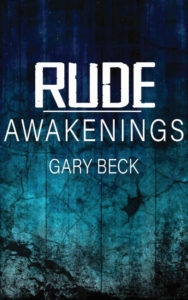
Amazon.com
Can an artist achieve the American dream without compromising creativity? Can lovers navigate the search of their desires while mourning the loss of past connection? And if the disillusioned accept our world of empty promises, don’t we all lose when that fire burns out? Poet Gary Beck masterfully approaches serious questions of human integrity, as well as the small odd moments our realities may share, in his brilliant new collection, Rude Awakenings.
We love your poems – Orchards Poetry
Wonderful work – Panoplyzine
Imagery and emotion that felt unique yet universal – Paradise Review
Featured Poems from Rude Awakenings:
i.
Faded
Dim flame dying
like a senile candle,
a flickering old woman,
crinkled fingers drooping
from large jeweled rings
as she sobs in septic sleep
that no lover’s steps
tread the midnights
of her bedroom.
ii.
Pilgrim
Leaving my land, place, roots,
another strange American
dazed with hungers,
breakfast cereal anticipations
for change, glory, just enough lust
to risk Moloch-belly flames
licking fire at asbestos bones,
spinning and circling a torturous orbit
returning me to beginnings,
stubborn, ruthless, orphan greedy,
playing no more rhymes on my toes, Granpa,
past twiddling, caring about rag clad dreams,
leaving me shivering for survival
from frostbite of vindictive atoms
unseen in the bustling commotion
in the churning harbor of unrest.
iii.
Two Refrains
For in darkness women came
and carried his body away.
The children by the shore of the lake
picked up his bones and followed the barge
and shrieked of the games they’d play the next day.
And while the children reveled
greed, our god, cloyed our senses
and ignorance, the priest,
drugged our minds,
leaving us stranded
on confusion’s shore.
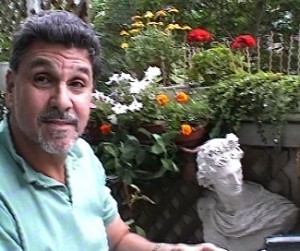
Gary Beck has spent most of his adult life as a theater director, and as an art dealer when he couldn’t make a living in theater. He has 12 published chapbooks and 2 accepted for publication. His poetry collections include: Days of Destruction (Skive Press), Expectations (Rogue Scholars Press). Dawn in Cities, Assault on Nature, Songs of a Clerk, Civilized Ways, Displays, Perceptions, Fault Lines, Tremors and Perturbations (Winter Goose Publishing) Rude Awakenings and The Remission of Order will be published by Winter Goose Publishing. Conditioned Response (Nazar Look). Resonance (Dreaming Big Publications). Virtual Living (Thurston Howl Publications). Blossoms of Decay (Wordcatcher Publishing). Blunt Force and Expectations will be published by Wordcatcher Publishing. His novels include: Extreme Change (Cogwheel Press), Flawed Connections (Black Rose Writing), Call to Valor (Gnome on Pigs Productions) and Sudden Conflicts (Lillicat Publishers). State of Rage will be published by Rainy Day Reads Publishing, Crumbling Ramparts by Gnome on Pigs Productions. His short story collections include, A Glimpse of Youth (Sweatshoppe Publications) and. Now I Accuse and other stories (Winter Goose Publishing). His original plays and translations of Moliere, Aristophanes and Sophocles have been produced Off Broadway. His poetry, fiction and essays have appeared in hundreds of literary magazines. He currently lives in New York City.
Robin Ouzman Hislop is Editor of Poetry Life and Times his publications include All the Babble of the Souk and Cartoon Molecules collected poems and Key of Mist the recently published Tesserae translations from Spanish poets Guadalupe Grande and Carmen Crespo visit Aquillrelle.com/Author Robin Ouzman Hislop about author. See Robin performing his work Performance (Leeds University)
Press Release. Aquillrelle’s Anthology Wall7.
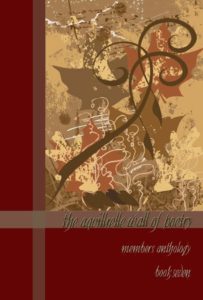
The Aquillrelle Wall of Poetry Members Anthology, book seven ©2018
Friends, poets,
Aquillrelle’s Anthology Wall7 is now released and published in both Ebook/PDF and Paper formats. It can be purchased on Lulu (and a couple of months from now also on Amazon, etc.).
Many thanks to the participants and to the supporters, it was hard yet gratifying work. Enjoy your (and your friends’) art!
The seventh wall. Some graffiti. Some works of art. Even some smudges included since they hold a message to be heard. Because this is the essence of every Aquillrelle wall – let everyone who values his/her word get a piece of the wall to themselves. You, the readers, are the beneficiaries. Read!
The poem included below is an excerpt from the above reviewed anthology
Elliptical Shift by Robin Ouzman Hislop
Meadows of wild flowers
sweet in an urban niche
framed by a hand of nostalgia
framed in an enclosure
for the price of pathos
riots of the human race
rampage across its space
in resistance, resentment
everywhere history obscures the view
an enigmatic phantom
it projects its rapacious plans onto tomorrow
McDonald’s signs, stewards of the planet, protein signifier
regularities merge into a wholeness
the news comes on, in a refrain of the same monotone
as if the world were made new again.
*
The darkest regions of the planet’s mind
the photon of a star in a formless moment
becomes an instance of a memory
as the desert invites the ripple
to a turbulence of refrain
a window frame constrains
its world view to all that follows on
as if it could choose between what’s real
what’s imaginary
such choices, shape our view
to the now, before an open future
*
sunset on the high street, traffic
vanishing into it like black dots
whizzing out of the blind, the zonk
plonk, disappearing into its shadow
dust of ages, its record
all the particles cascading
into the horizon’s viewpoint
all the bits, pieces in their parts
blowing on the horizon’s sunset
Time is not the shadow cast by the world
the world is the shadow cast by time
(excerpt from All the Babble of the Souk)
To order: http://www.lulu.com/shop/Aquillrelle/The Aquillrelle-Wall of Poetry Book Seven/paperback/
e-book: http://www.lulu.com/shop/Aquillrelle/The Aquillrelle Wall of Poetry Book Seven/ebook/
Robin Ouzman Hislop is Editor of Poetry Life and Times his publications include All the Babble of the Souk and Cartoon Molecules collected poems and Key of Mist the recently published Tesserae translations from Spanish poets Guadalupe Grande and Carmen Crespo visit Aquillrelle.com/Author Robin Ouzman Hislop about author. See Robin performing his work Performance (Leeds University) .
Spike. Poem excerpt from Cartoon Molecules by Robin Hislop
A runaway on a Singularity slippery slope need not be a despairingly
Sisyphean slide back but spike upward to an extremely great verticality
allowing something relatively harmless today start a trend that results
in something currently unthinkable a – Pandorean pandemonium
still he didn’t want to kill himself and his crew so he hatched a plan
that systems possessing the same patterns of causal organization will instantiate
the same types of conscious states irrespective of whether the organization
is implemented in neurons – silicon – plastic or any other substrate
taken to its heart we would vanish into its stronger existence – do the angels
really only take back what is theirs – what has streamed out of them – or is there
sometimes – as if by oversight something of our being as well? – do we not see
the swirling return to ourselves (how should we see it?) the world today being
as it is a vast unsupervised laboratory – in which a multitude of experiments
are simultaneously under way
brain-computer interfaces have already left the laboratory which allows gamers
to interact directly with their consoles – a high resolution neuro-signal
acquisition and processing wireless neuroheadset uses a set of sensors to tune
into electric signals produced by the brain to detect player thoughts feelings
and expressions and connects wirelessly to most PCs’ — all this for only $299!
partly this is because we cannot agree on what such purposes are – and even if
we were to – suddenly he knew that when he heard the music he would be unable
to resist steering toward the island’s rocks – the problem wasn’t the present
rational Ulysses – but instead the future illogical Ulysses – the person he’d become
when the Sirens came within earshot
but that is the gods’ affair – if only we too could discover a pure contained – human
place – a strip of fruitful land of our own – between river and stone!- for our own heart
exceeds us – the curve of the graph grows exponentially steeper – until that spike is
the Singularity – beyond the veil of the opaque wall – the unthinkable – the horizon
of the final dawn looms – lanced on the spear of the terrible angel.
After Rainer Maria Rilke. Duino Elegies
Robin Ouzman Hislop is Editor of Poetry Life and Times his publications include All the Babble of the Souk and Cartoon Molecules collected poems and Key of Mist the recently published Tesserae translations from Spanish poets Guadalupe Grande and Carmen Crespo visit Aquillrelle.com/Author Robin Ouzman Hislop about author. See Robin performing his work Performance (Leeds University) .

